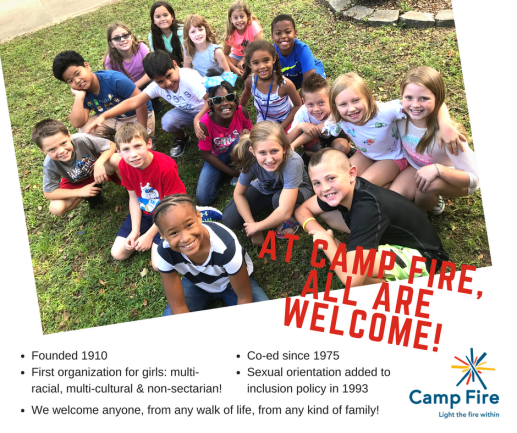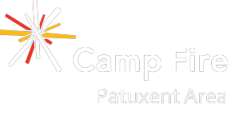How Do I Start A Camp Fire Club
Make a difference, see the difference…as a Camp Fire Leader! In Camp Fire Clubs, boys and girls have fun, but they are also learning valuable lessons that will stay with them for a lifetime.

Leaders organize participant-led activities for boys and girls to help them explore and develop their natural abilities. Camp Fire encourages kids to make healthy choices, build relationships, find their leadership abilities, learn community responsibility and develop life-long interests.
Age appropriate materials and training are provided to guide you. You will also meet other leaders to share ideas and activities to make your leadership experience successful and fun. As a club leader, you decide your group’s age, gender mix and number of members. Clubs can meet every week, every other week, or even monthly either during the school year or all year. You decide! The time commitment depends on the number of times you meet per month and what types of activities you chose. Camp Fire Clubs aren’t limited to one leader…we also encourage co-leading with other adults!
- Traditional Clubs can begin with 2 adult leaders with 3 children not from the same household.
- Family Clubs can begin with 2 families with a minimum of 3 children.
There must always be 2 adults not from the same family serving as leaders.
While all clubs share the same core values, every Club has flexibility to design their own activities. Average sized Clubs are between six to eight kids. Both youth and adults set the direction of activities and projects. All clubs have the opportunity to earn money for outings through our annual Candy Sale fundraiser.
Camp Fire kids are rewarded with emblems and/or beads for reaching their goals. As an important part of Camp Fire programs, it helps to build self-esteem and pride. The Camp Fire curriculum helps Leaders guide our youth to discover their spark and Light the fire within.
To start a club
Contact the Office to set up a parents meeting in your area. Email: info@campfirepatuxent.org These are meetings where you bring together other parents and kids who might be interested in being part of a Camp Fire Club. A member of the Camp Fire Staff will meet with you to help you determine what model of club is best for your participants.
Participate in Training and screening for Adult leaders. This includes both online and in person training. All adult leaders/advisors must complete fingerprinting background checks for Child Care as well as complete an application and be interviewed by staff.
- Camp Fire Clubs offers adults training and support to become mentors in their families, neighborhoods, and communities.
- Camp Fire Leaders share with each other.
Next Steps:
- Identify the model that best works for you.
- Identify a meeting location
- Set a program meeting day and time
- Invite children/families to join the program
- Register all youth and adult participants
- Get your club Going.
Camp Fire Clubs are offered for children age 3 through 18 with some college programs.
Classic Club Leaders: With a co-leader, you hold regular (weekly, bi-weekly or monthly) meetings with kids from your and other families. Club activities may include: arts and crafts, snack(!), field trips, Fundraising), following Trails and earning emblems, camping, games and songs. Each club is unique, depending on the interests of its leaders, parents and members.
Family Club Leaders: Instead of dropping off the kids, parents are part of the meetings. Parents and children bond while working together on projects and activities. Families may share a meal, hold a service project, or more. Parents share delivering program to youth according to various age groups.
Program Levels
Each program level teaches responsibility, decision-making, and other valuable skills through a variety of projects centered around five focus areas called Trails:
- Trail to Knowing Me
- Trail to Family and Community
- Trail to Creativity
- Trail to the Environment
- Trail to the Future
Little Stars: Pre-Kindergarten (Ages 3-5)
More than just a play date. The Little Stars program provides the opportunity for young children to master the art of socialization, learn how to work together, and skills like taking turns and sharing. Projects are age appropriate and serve as an introduction to Camp Fire.
Starflight: Kindergarten – 2nd grade
Boys and girls learn responsibility, decision-making and other valuable skills through a variety of projects focusing on family, nature and the outdoors, safety, science, health, community service, art, music and drama. They learn while working together and having fun. All projects are designed to fit the abilities and interests of this age level. Recognition is an important component of the Starflight program, and youth receive emblems or certificates after completing a project.
Adventure: 3rd – 5th grade
Adventure members learn to work together and develop planning and decision-making skills, as well as skills related to their individual interests. Recognition in the form of beads, emblems and certificates is given after a project or activity is completed, which helps build self-esteem and pride. Adventure participants work on a variety of projects including outdoor action (learning safe outdoor skills, including fire building, using a compass, and following maps), community service and more.
Discovery: 6th – 8th grade
Camp Fire youth explore their roles as members of families, schools, churches, neighborhoods, teams or other groups in the Discovery program. In “Discover Yourself,” youth explore who they are and who they want to be; they plan for the present and prepare for the future. In “Discover Community,” youth have opportunities to learn how communities work and how, as individuals, they can affect change in their communities. Opportunities to explore specific areas of interest, to them or their club, are available in the form of Torch Bearer projects.
Horizon/Teens in Action: 9th – 12th grade
At this level the program is as varied as the individual. Teens are encouraged to participate in activities as individuals or with their Club. In the Horizon program, teens are given the opportunity to create and build their own horizons, or futures. “Highlight” activities are designed to examine ideas, values, morals and experiences. Four “Reflection” projects provide focus for teens on self, choices and decisions, future goals and planning, and self-reliance skills. Teens typically begin working toward the Wohelo Award, the highest honor that can be earned by a youth.
